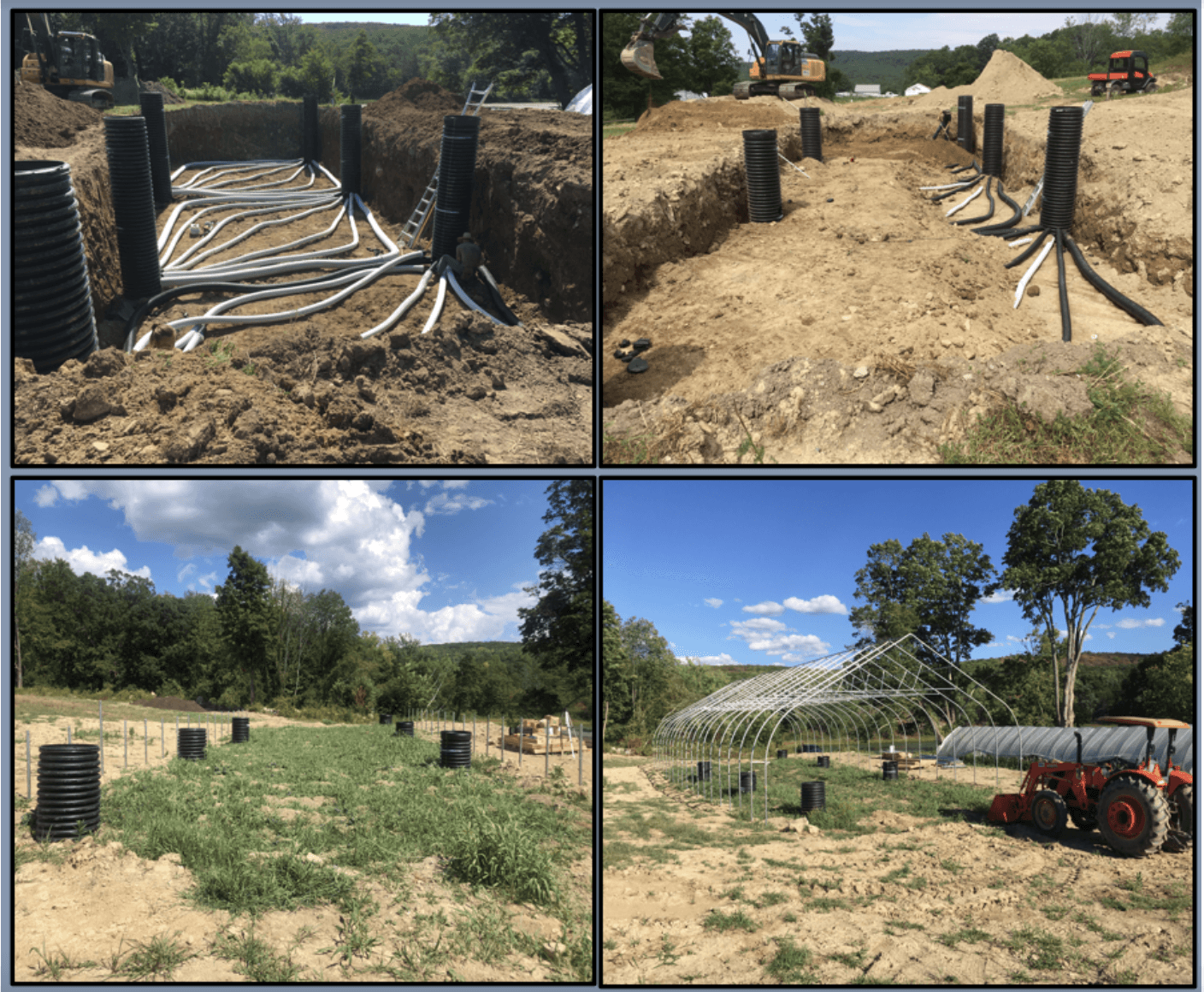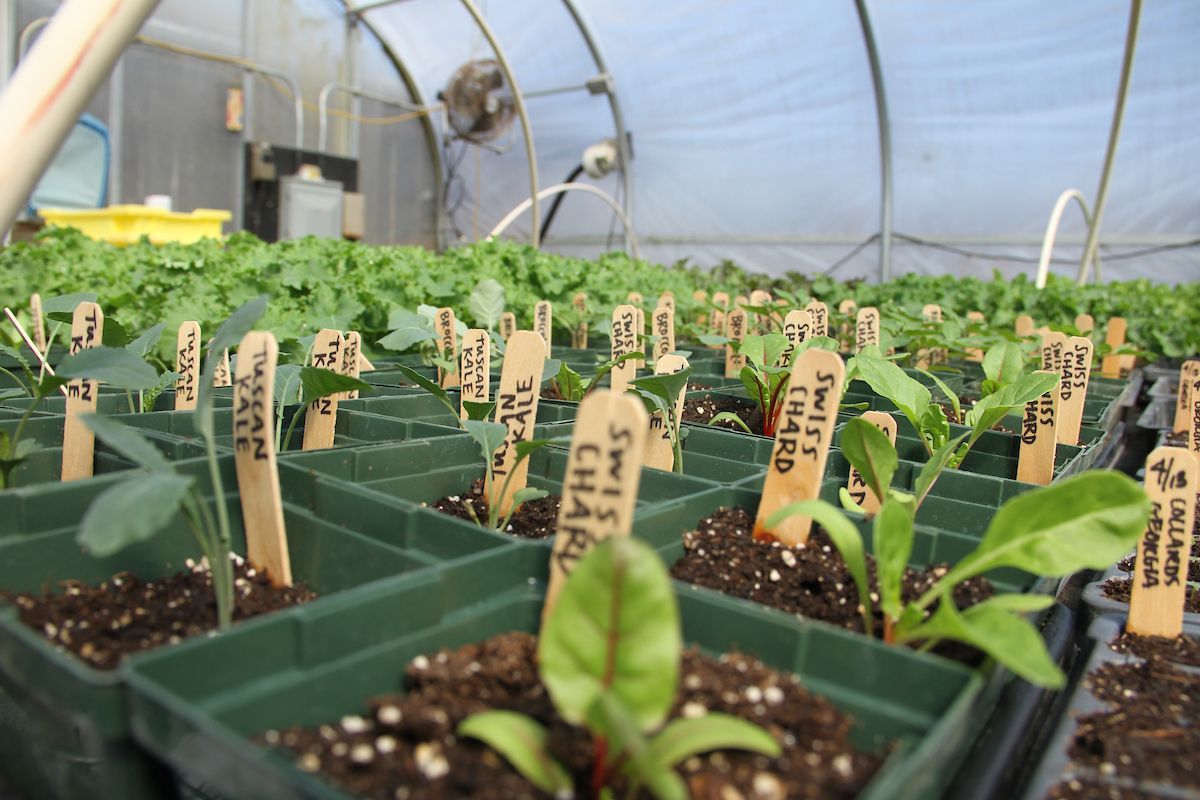
Farming during the climate crisis requires constant re-evaluation of our land management practices and production systems. At Glynwood, we have greenhouses where we grow food through the winter and start early crops in the spring. While some greenhouses are unheated, one is heated with propane to provide extra warmth to the crops. This summer, we installed a ‘climate battery greenhouse’ at Glynwood—a simple yet innovative system that creates a versatile indoor growing space that can be used year-round without relying on fossil fuel for added climate control.
This greenhouse—also known as a ‘high tunnel’—is built of steel tubing and covered with two layers of polyethylene sheeting. High tunnels are generally less permanent, less expensive to build, and have less sophisticated ventilation and electrical components than a traditional greenhouse.
The space underneath this greenhouse is the unique aspect to this system. There is a large matrix of perforated tubing embedded in the soil. When the above-ground air inside the greenhouse heats up during the day, thermostat-regulated intake fans move the warm air underground through perforated tubing until a target above-ground temperature is reached. The soil absorbs the warm air, which is stored there during the day and into the night. (Even in the cool months, there is often excess heat in high tunnels that needs to be exhausted out if it cannot be captured and stored.) At night, the thermostat-triggered fans push the warmed air in the soil back into the above-ground space. This system provides a way of using the sun and the soil for the purposes of heating and cooling. The term “battery” in this case refers to the soil, since the soil is storing the warm air during the day. This is different from geothermal technology, which actively utilizes the internal thermal energy of the earth at depths of about 20 feet or greater. Although a climate battery benefits from the relative stability of soil temperature, soil itself does not serve as a heat source.
As far as we know, Glynwood’s climate battery system will be only the second in the Hudson Valley. There are others elsewhere, but not many. Kyle Nisonger, a former Glynwood incubator participant who is now at Maple View Farm in Poughquag, NY, installed a climate battery greenhouse in 2021. With a background in HVAC engineering he designed the system himself and has been operating it throughout the 2022 growing season.
At Glynwood we plan to have our climate battery high tunnel fully operational by October. We will grow winter hardy vegetables in this high tunnel (such as spinach and chard). The battery below the soil includes almost 3,000 feet of 4” and 6” perforated plastic tubing. There are three 24”-diameter intake and outlet risers with the smaller diameter connection tubes running every two feet below the soil surface. At eight feet deep, the matrix fits within the 30’ x 72’ footprint of the high tunnel above. That makes it a 17,000+ cubic foot storage battery. You can view some of the Glynwood climate battery installation process here. We used the plans from Atmos Greenhouse Systems based in Mechanicsburg, PA. Atmos owner Tim Clymer is a farmer with several operating climate battery greenhouses and high tunnels. We plan to install soil and air temperature sensors in Glynwood’s system in order to collect data that will allow us to share information and best practices as part of a network of climate battery owners.
Upfront material costs for the climate battery and high tunnel are significant, but will pay for themselves in propane fuel cost savings. Installation labor time is also a large upfront investment. Heavy equipment and a skilled machine operator are necessary for efficient layout, excavation, and earth moving work. At Glynwood we were able to keep all of our installation labor in-house, requiring approximately 70 person hours from initial hole excavation to tube matrix construction and backfill completion.
The Glynwood team is excited about the climate battery system because it will increase our climate resilience practices with an active way to further utilize solar energy to grow nutritious food. We look forward to getting it fired up and sharing our trials, successes and errors with you. Glynwood is working with Cornell Cooperative Extension Climate Resilience Specialists to plan a climate battery field day for farmers in late winter 2023.

